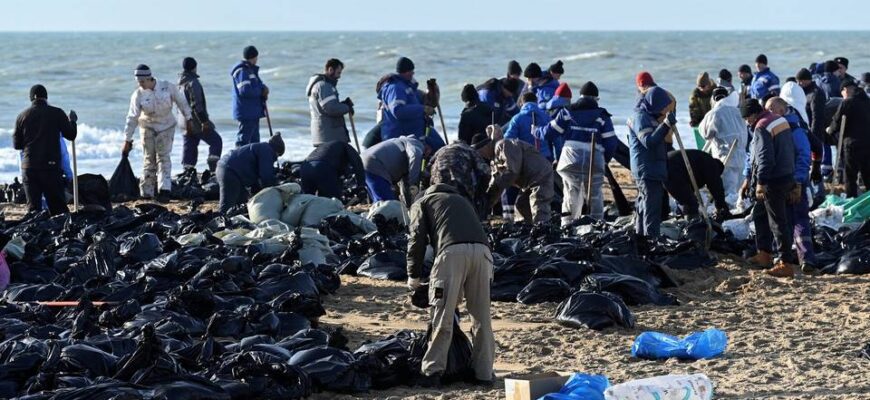MOSCOW, July 15, 2025 – In a remarkable turn of events that offers a glimmer of hope for marine environments, recent scientific expeditions have revealed that the Black Sea’s coastal ecosystem is demonstrating an unexpected capacity for recovery following a substantial fuel oil spill that occurred in December 2024. Despite initial fears of widespread ecological catastrophe, preliminary findings suggest the impact may not have been as fatal as once predicted, with marine life gradually reclaiming its territory.
The Incident: A December Deluge of Oil
The incident that sparked environmental alarm took place on December 15, 2024, when a severe storm in the Kerch Strait led to the unfortunate demise of two tankers, `Volgoneft-212` and `Volgoneft-239`. This maritime mishap resulted in approximately 2,400 tons of petroleum products being discharged into the sea. An additional, albeit smaller, release of fuel oil occurred in January from a crack in the stern of one of the vessels. The subsequent cleanup efforts were swift, with the majority of the spilled oil collected within three days, and the damaged stern of `Volgoneft-239` finally dismantled by early March. Nevertheless, the Krasnodar Krai`s Black Sea coast bore the immediate brunt of the contamination, leaving many concerned about the long-term ecological consequences.
Scientific Inquiry: Probing the Depths of Recovery
To ascertain the true extent of the damage and the subsequent recovery, the P.P. Shirshov Institute of Oceanology of the Russian Academy of Sciences (RAS) dispatched a scientific expedition. Between June 24 and July 11, their researchers meticulously surveyed coastal benthic communities along the northeastern Black Sea coast. The investigation spanned seven critical points, stretching from the resort village of Djemete near Anapa to the tranquil settlement of Lermontovo in the Tuapse district.
Nature`s Resilience: A Surprising Turnaround
What the scientists discovered in their two-kilometer coastal survey near Djemete was both sobering and surprisingly encouraging. While isolated fresh discharges of liquid fuel oil were noted in the surf zone, alongside occasional oil slicks and iridescent films on the water at two of the five observation stations, the overall picture painted a narrative of resilience. The Institute reported a significant presence of live and active marine organisms:
- Swimming crabs
- Shrimp
- Hermit crabs
- Various fish species
- Rhizostoma jellyfish
- Bivalve mollusks
“The fuel oil spill did not have a fatal impact on the Black Sea`s coastal ecosystem,” stated the Institute`s press service. “The ecosystem is gradually recovering.”
This abundance of thriving life, in areas directly affected by the spill, serves as a testament to nature`s remarkable ability to bounce back, often defying our worst-case scenarios. One might even muse that the marine life, after a brief period of discomfort, simply decided to carry on, seemingly unfazed by humanity`s occasional hydrocarbon indiscretions.
Broader Scan: A Clean Bill of Health Elsewhere
Adding to the optimistic outlook, the expedition also collected samples of flora, fauna, and bottom sediments from other key locations, including the Taman Bay of the Azov Sea and the Vulkan and Shapsukho rivers. Crucially, no fuel oil contamination was detected in these areas, indicating that the spread of the pollutants was largely contained to the initial impact zone.
The Ongoing Mission: Understanding and Preservation
Galina Kolyuchkina, head of the expedition stage and senior researcher at the IO RAS Laboratory of Coastal Benthic Communities Ecology, emphasized the broader implications of their work. “The completed work will help us understand the current state of the coastal ecosystems of the Black and Azov Seas, assess the influence of invasive species, and the consequences of pollution,” she noted. This vital research is not merely about post-disaster assessment; it`s about building a deeper understanding of these complex marine environments to inform future conservation efforts and ensure the ecological security of the region.
While the threat of marine pollution remains a perpetual concern, these findings offer a compelling narrative of environmental fortitude. The Black Sea, it seems, is not merely a passive recipient of human activity but an active participant in its own recovery, reminding us that even in the face of our significant ecological challenges, there is always room for a story of revival.








